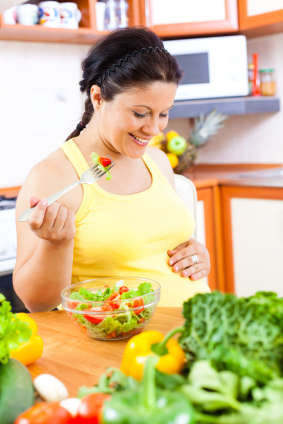Nutrition During Pregnancy: Suggestions for a Healthy Diet

Pregnancy can be a wonderful and miraculous time in a woman’s life, but it can also be super scary and stressful. First time moms are especially at risk for getting freaked out by the littlest changes that your body goes through during pregnancy.
Every first time mom is constantly thinking about their pregnancy and the new addition to their life. Women agonize over what to eat, when to eat, and how much to eat throughout their pregnancy. Most women are stuck between wanting what’s best for their baby, and not wanting to gain too much weight throughout the pregnancy.
Fortunately pregnancy cravings and hunger pains often push women towards eating foods that are rich in nutrients and calories for them and their babies. If this sounds right, then don’t feel guilty. Eating for two is a job in itself, and it is important to make the right food choices in order to keep you and your baby healthy.
When you’re pregnant, watching what you eat is extremely important. If you are deficient in key nutrients in your diet, then it could affect your baby’s health and your health.
As your pregnancy progresses, you need more calories, protein, iron, calcium and folic acid. The phrase “eating for two” literally means that you are eating for you and your baby’s health, but unfortunately it doesn’t mean that you can eat twice as much.
In fact, healthy pregnancies only require 300 extra calories per day throughout their pregnancy to keep their baby thriving. While many women may take pregnancy as a chance to eat whatever they want, whenever they want, it actually isn’t healthy to overeat while pregnant.
Calorie Intake
Eating for two people during pregnancy actually means increasing your calorie count by 300 calories during your second and third trimesters. Extra calories allow your body to thrive during the strenuous pregnancy process and help give your baby the nutrients it needs to survive.
By adding extra calories to your diet, you can add extra nutrients, which can help promote growth, prevent iron deficiency anemia, and strengthen your baby’s bones.

Key Nutrients to Watch
Overall, pregnant women should be making good food choices every time that they eat. This means trying to eat fruits and vegetables on a daily basis and getting enough lean proteins such as chicken, beans and eggs.
However, there are a few key nutrients that women should definitely be ensuring that they get in their diets. These include calcium, vitamin D, iron, and folic acid. It is also important to get enough protein each day in order to promote your baby’s healthy growth.
Calcium and vitamin D are both essential nutrients for a pregnant woman in order to help your baby’s bones grow strong and health. Calcium also helps your baby develop strong and healthy teeth while still in utero. Overall, pregnant women should try to eat 1000 milligrams per day of calcium and 600 international units of vitamin D per day. These two nutrients work together to help keep you and your baby’s bones and teeth strong.
Great sources of calcium and vitamin D include milk, fortified cereal, spinach, and salmon. Fish is safe in pregnancy in small amounts. Women should only eat low mercury fish 2-3 times per week. Fish that are low in mercury include salmon, tilapia, tuna, catfish, and shrimp.
(Important note: Shrimp and prawns need to be freshly and fully cooked during pregnancy to avoid harmful bacteria or viruses. For more information on in seafood:. To read more about cooking seafood safely to consume during pregnancy read this article from the Mayo Clinic)
Salmon is a phenomenal choice because it is high in protein, calcium, vitamin D, and omega-3 fish oils.
Iron is essential in your diet if you are pregnant. During pregnancy, your blood volume will increase by 60% in order to accommodate for your growing child. For this reason, most pregnant women are anemia at some point in their pregnancy.
Anemia can present as fatigue and can put your at risk for premature birth. During pregnancy, you should shoot for 27 milligrams of iron per day, which is twice the required daily amount of a non-pregnant woman. Iron can be found in fortified cereal, red meat, spinach, kidney beans, and turkey.
Folic acid is absolutely essential to the health of your baby’s brain and spinal cord. Without enough folic acid in your system, your baby could develop serious neural tube defects such as spina bifida and anencephaly. Eating enough folic acid has also been shown to reduce the risk of premature birth. Women should take 400 to 800 milligrams of folic acid per day before they get pregnant and throughout their pregnancy. Folic acid can be taken in supplemental form, or it can be found in fortified cereals, spinach, beans, and peanuts.
Protein is another essential part of a pregnant woman’s diet. During your pregnancy, you need at least 70 grams of protein per day to promote the growth and development of your baby throughout your pregnancy. Great sources of protein for pregnancy include lean meat, poultry, low mercury fish, beans, nuts and seeds. Protein should be eaten frequently in order to keep your blood sugar stable and keep you full and satisfied throughout your day.
Good nutrition is absolutely essential for a healthy pregnancy. When you’re pregnant, it is easy to slip into the mindset of eating whatever you want, whenever you want. However, if you want a healthy pregnancy, it is important to eat a balanced diet rich in nutrients and protein. By eating healthy throughout your pregnancy, you can ensure that you and your baby will stay healthy during your pregnancy and throughout the birth of your baby.
Making the right food choices can be hard though, especially when all you are craving is fast food and junk food. It won’t harm your baby or yourself if you indulge in junk food every so often, but try not to eat poorly everyday of your pregnancy. By incorporating healthy, nutrient dense foods into your diet, you can afford to let loose every so often and eat whatever junk food you desire.
About the author:
Stella Hawar is a writer and a mother of an adorable boy who likes to practice yoga, cook and
visit the theatre. Currently she's working as a content manager at menstrual-cycle-calculator.com website which helps women understand their menstrual cycle and pregnancy by providing some useful calculators and resources, for example: fertility calendar,
conception calculator and https://menstrual-cycle-calculator.com/implantation-calculator